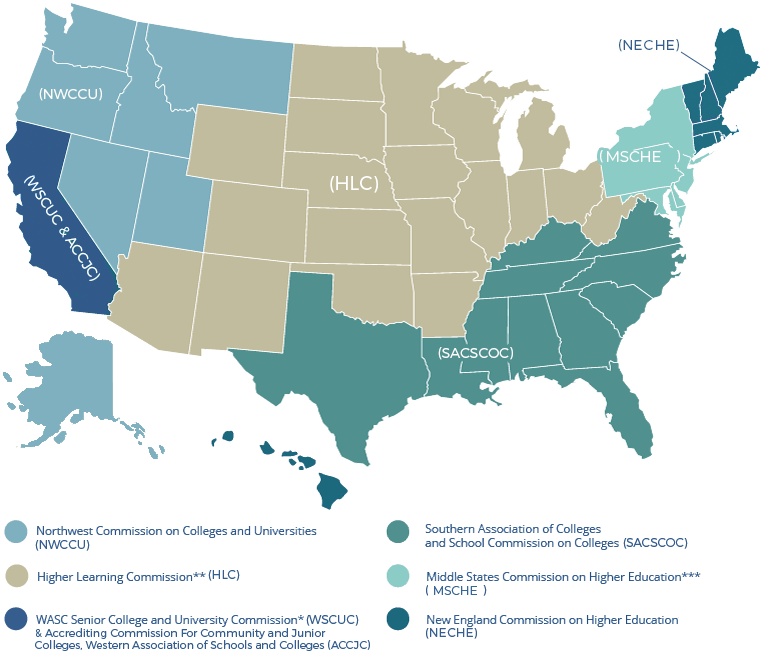Key Takeaways:
- Accreditation ensures schools and programs meet specific quality standards.
- Accreditation is not the same as state-approval.
- Accreditation is not a permanent status.
- Accreditation can be institutional or programmatic.
- To receive U.S. federal student aid, institutions must be accredited by a nationally recognized agency.
Some schools make bizarre promises—like getting a “bachelor’s degree in a matter of months”—that turn out to be nothing more than smoke and mirrors. And what do they do? They snatch your hard-earned money, leaving you high and dry without a promising future.
Well, that’s where accreditation helps. Before you pick your college, it’s vital that you know who accredits the school and how accreditation is going to affect your career path moving forward. By the end of this article, you’ll understand the different types of accreditation, their purpose, how to verify if your college is accredited, and more.
What Does “Accredited” Mean? What Is Its Purpose?
Accreditation is a rigorous process that evaluates schools and degree programs to ensure they meet specific standards of quality. Think of it as a stamp of approval, signifying that a school provides excellent academic value to its students.
Independent accrediting agencies conduct thorough assessments to determine whether institutions maintain these high standards. These agencies should be recognized by the Council for Higher Education Accreditation (CHEA) and/or the United States Department of Education (USDE) to ensure that dubious accrediting organizations don’t provide cover for diploma mills.
Moreover, you can only receive federal aid if the institution is accredited by a USDE-approved agency. USDE recognition ensures accrediting organizations maintain the quality of institutions receiving federal funds.
CHEA recognition, on the other hand, focuses on maintaining and improving educational quality. It’s voluntary and recognizes accrediting organizations that meet CHEA’s standards for academic integrity, student success, and public accountability, regardless of their role in federal financial gatekeeping.
Simply,
- USDE-recognition: Eligible for receiving federal financial aid
- CHEA-recognition (voluntary): Ensures academic quality according to CHEA standards
Accreditation isn’t permanent, schools often have to renew their accreditation after a certain period of time. That way, you can be sure that the academic quality is consistent over time. Here are some more overarching benefits to getting enrolled in an accredited college or university:
- Quality Assurance: Accreditation upholds quality education standards.
- Financial Aid: Only USDE-accredited schools receive federal financial aid.
- Credit Transfer: Credits earned at accredited institutions are more widely accepted.
- Employment: Employers value degrees from accredited schools.
- Professional Connections: Schools that are accredited offer stronger professional networks and alumni connections.
| CAUTION: Accreditation is different from state-approval. While state-licensed or authorized schools meet the minimum requirements set by the state to operate, accreditation speaks to the quality of education offered by these institutions. |
Accreditation broadly falls into two main categories, institutional and programmatic accreditation. Let’s compare these two and see how they work together to provide you with the best education.
What is Institutional vs. Programmatic Accreditation?
Institutional and programmatic accreditation are two different types of accreditation that higher education institutions can receive. Both types of accreditation are important, but they serve different purposes.
Institutional accreditation refers to the accreditation of the entire institution, including all its programs and campuses. It evaluates whether the institution as a whole meets certain standards of quality and integrity. This type of accreditation is typically granted by regional or national accrediting agencies. You can find more information on the types of institutional agencies in the next section below.
Programmatic accreditation, on the other hand, is specific to a particular program or department within the institution. This type of accreditation is typically granted by professional accrediting agencies that specialize in a specific field of study.
| NOTE: Even when a school is accredited at the institutional level, only a few degree programs may be accredited by programmatic agencies. Not all fields of study need programmatic accrediting agencies. |
Here’s a quick comparison between the two:
| Aspect | Institutional Accreditation | Programmatic Accreditation |
| Focus | Evaluates the entire educational institution as a whole | Assesses specific academic programs or schools within the institution |
| Purpose | 1. Checks organizational credibility and eligibility for credit transfers and federal financial aid 2. Most grad school and professional programs require you to have a bachelor’s degree from a college or university that’s institutionally accredited | 1. Validates the quality and standards of specific programs, facilitating licensure for regulated professional fields, such as law 2. Enhances your academic prowess to potential employers and speaks to your knowledge and skills acquired during your degree studies |
| Assessment | Looks at governance, resources, faculty qualifications, and overall mission | Focuses on curriculum, faculty expertise, student outcomes, and program-specific resources |
Here’s the list of recognized institutional accrediting agencies:
According to the most in-demand majors for this year, these are some few programmatic accrediting agencies to know:
| Field of Study / Major | Programmatic Accrediting Organizations | CHEA Recognition Status | USDE Recognition Status |
| Nursing | Accreditation Commission for Education in Nursing | ✅ | ✅ |
| Business | Accreditation Council for Business Schools and Programs | ✅ | ❌ |
| International Accreditation Council for Business Education | ✅ | ❌ | |
| Healthcare | Commission on Accreditation of Healthcare Management Education | ✅ | ❌ |
What is Regional vs. National Accreditation?
| NOTE: Previously, institutional accreditation was strictly divided into regional and national accreditation but the USDE issued new regulations to allow regional accreditors to expand their reach and accredit schools beyond traditional boundaries. |
Regional accreditation is a process that grants accreditation to educational institutions within a specific group of states, or a specific region of the country. There are seven operating accrediting bodies that are divided into six geographic regions:
- Middle States
- New England
- North Central
- Northwest
- Southern
- Western

SOURCE: https://www.chea.org/regional-accrediting-organizations-accreditor-type
Regional accreditation is highly recognized and considered the standard for college accreditation. It is recognized by both the USDE and the CHEA. Most regionally accredited institutions are degree-granting, non-profit, and academically oriented.
National accreditation, on the other hand, is not limited by region or geography. Instead, it accredits schools and colleges throughout the country based on their programs or types of schools. These agencies are often associated with trade, vocational, and career-based schools. They also accredit some religious schools.
Related: How to Choose Between Public vs Private Colleges
Credits and degrees from regionally accredited institutions are more widely recognized and accepted for transfer than those from nationally accredited schools. However, please keep in mind that accreditation does not guarantee that credits will transfer, as each institution has its own transfer policies.
| NOTE: Moreover, please understand that regardless of the type of accreditation, the quality and content of the courses usually carry more weight. The depth of knowledge and skills you acquire from your courses can have a greater impact than the accreditation of the school itself. |
It’s always a good idea to check the accreditation status of a school or program before enrolling, especially if you plan to transfer credits or use the degree to pursue further education or certain career paths. Here’s the list of regional and national accrediting agencies to know:
| National Faith-Related Accrediting Organizations | CHEA Recognition Status | USDE Recognition Status |
| Association of Advanced Rabbinical and Talmudic Schools (AARTS) | ✅ | ✅ |
| Association for Biblical Higher Education Commission on Accreditation | ✅ | ✅ |
| Association of Institutions of Jewish Studies | ❌ | ✅ |
| Commission on Accrediting of the Association of Theological Schools | ✅ | ✅ |
| Transnational Association of Christian Colleges and Schools Accreditation Commission | ✅ | ✅ |
| National Career-Related Accrediting Organizations | CHEA Recognition Status | USDE Recognition Status |
| Accrediting Bureau of Health Education Schools | ❌ | ✅ |
| Accrediting Commission of Career Schools and Colleges | ❌ | ✅ |
| Accrediting Council for Continuing Education and Training | ❌ | ✅ |
| Council on Occupational Education | ❌ | ✅ |
| National Accrediting Commision of Career Arts and Sciences, Inc. | ❌ | ✅ |
How Do You Find Out If a College or Degree Program Is Accredited?
Accreditation is not mandatory in the U.S., and that’s why it’s so important for you to run a check on colleges and degree programs before you join them. A school can operate without any accreditation. If you end up joining one of these institutions, this is what it means for you:
- You may not be eligible for federal financial aid.
- You receive credits for minimal effort that does not align with your academic readiness for graduate-level programs.
- You may not get the best education as offered by accredited programs.
- You may not qualify for graduate and professional programs and state-licensure to practice regulated roles. Moreover, your credits will most likely not be transferable anywhere.
- Employers may not value your degree.
The key for you is to research the specific accreditation needed for your career path before you enroll in any program. You can refer to the official U.S. Bureau of Labor Statistics (BLS) website to check the degree requirements for any regulated profession. Here are the next steps:
- Select the role you are interested in from the “occupation groups” panel on the left-hand side of the web page and once you select your exact occupation, navigate to the “how to become one” tab to see the details.
- Check which degrees you need to pursue for your dream role. Additionally, see if you require a graduate degree and state-licensure or certification of any kind to practice your profession. If that’s true, pursuing an accredited program is in your best interest.
- Once you know which degrees to pursue, head to the directory of the CHEA- and/or USDE-recognized programmatic accrediting organizations and select your field of study. This is where you’ll receive the name of the programmatic accrediting body.
- Click on “view profile” right below the accreditor’s name to get access to all accredited programs with corresponding data on college, state, and city.
| NOTE: In order to receive federal student aid from the U.S. Department of Education, your institution must be accredited by a “nationally recognized” accrediting agency. |
Here are a few more steps you can follow to check institutional accreditation of colleges:
- Go to the school’s website. Check their accreditation page. It should be under their “about” section or somewhere similar. Or you can just type in the college’s name in the Google search bar and add the word “accreditation” in front of it. That should display the right page.
- Cross check the accreditation status claim of the college with the USDE-list of agencies for most up to date information. Visit the official website of the accrediting agency and try to find the name of the college listed as “accredited”.
- You can also search for reviews on the institution’s official website and third party review sites to get a subtle understanding of the quality of education provided by the school. This exercise may also help you understand if the institution lacks accreditation or if it’s on its way to losing it.
How Do Colleges Get Accredited
Institutional accreditation involves two major phases.
First, there’s the self-study, which typically occurs approximately every ten years. During this introspective phase, the institution evaluates its own performance against established parameters.
Faculty members, administrators, and other stakeholders form internal working groups to assess various aspects of the institution. They consider standards related to curriculum, faculty qualifications, student support services, infrastructure, and more.
Additionally, there’s an interim report conducted every five years (though timelines can vary by accrediting agency). During this phase, the institution provides an update on its progress since the last self-study.
Based on the evaluation process, the accrediting agency produces a formal letter. Here are the possible outcomes:
- Acceptance: If the institution’s self-evaluation aligns with the established standards, the accreditor accepts it. The letter outlines the timeline for the next report.
- No Further Evaluation: Ideally, the letter indicates that no additional evaluation is necessary for the next five years. This implies that the institution is meeting the required standards.
- Special Attention: Sometimes, the accreditor highlights specific areas that need closer scrutiny in subsequent evaluations. These might be aspects where improvement is needed.
- Conditional or Probationary Status: If the institution falls short of certain standards, the accreditor may impose conditions. The institution must address these deficiencies within a specified timeframe.
- Withdrawal of Accreditation: In extreme cases, the accreditor may withdraw an institution’s accreditation. This decision is usually based on complex issues, often related to financial instability.
How to Spot Signs of Probation or Censure in Colleges
If the college you’re looking into isn’t on the probation list yet and you want to track its progress, you can check its current accreditation status and a couple of other indicators to be confident about its future.
To assess the latest status of the school you’re considering, refer to the accreditor’s public announcements. On some websites, this information might be listed under “upcoming reviews”.
These pages often include action letters, which are comments from accreditors about the ongoing review of the institution, and a college scorecard. Both of these resources can help you get valuable insights into the administrative health of the institution.
Related: Campus Life: What to Expect As a First-Year Student
NOTE:
Please know that the process of revoking accreditation status from institutions is not immediate. Schools are provided with ample warnings and opportunities to correct the issues before any major action is taken.
Conclusion
With a well-earned degree, you gain a competitive edge in the job market, increasing your chances of cracking high-paying job interviews and securing promotions throughout your career. So, make sure you get your degree from an accredited school.
Whether you choose to enroll in an on-campus or online degree program, make sure the entire institution is accredited and the specific program is accredited by a relevant programmatic accrediting body. That’s the best case for you moving forward.
Frequently Asked Questions (FAQs)
Unlike institutional accreditation (which applies to entire colleges or universities), programmatic accreditation focuses on individual degree programs or schools.
It’s particularly important in fields like business, law, nursing, engineering, education, social work, forensic science, psychology, counseling, therapy, and healthcare.
Yes, business, nursing, education, and psychology fields (and similar others) have more than one accrediting agency. For instance, nursing programs are primarily accredited by either the Commission on Collegiate Nursing Education (CCNE) or the Accreditation Commission for Education in Nursing (ACEN).
There are additional accrediting agencies that focus on specialized nursing degree programs, such as nurse anesthesia and nurse-midwifery programs. When exploring these accrediting bodies, check their websites to understand their specific evaluation standards and the scope of their evaluation.
Generally, the evaluation scope is quite similar, but it might vary based on degree level and speciality. For example, currently, CCNE doesn’t evaluate associate-level degree programs, whereas ACEN evaluates nursing programs at all degree levels.
Moreover, there are a bunch of study fields and careers that don’t have a specific accrediting agency. These fields can include, but aren’t limited to, certain areas of the humanities, social sciences, natural sciences, and some interdisciplinary fields.
In these situations, accreditation might not be applicable because the field doesn’t have a clear set of professional standards or the field is so wide and varied that it would be impractical to apply a single set of standards.
Instead, the quality of programs in these fields is often assessed through institutional accreditation process, which evaluate the institution as a whole rather than specific programs. Please note that the absence of programmatic accreditation doesn’t necessarily mean a lack of quality or rigor.
In the event where your school loses its accreditation, transfer to another college to safeguard your credits and circumvent potential financial aid difficulties.



